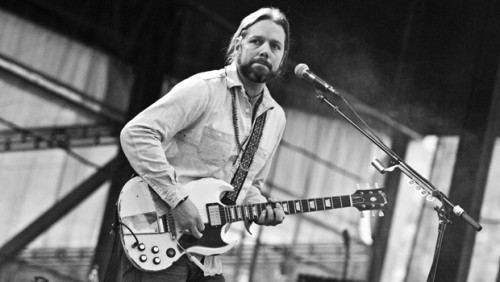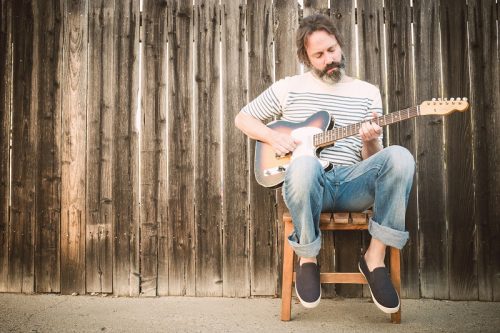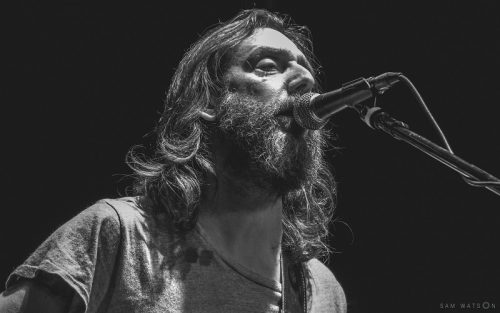By Michael Lello
Top photo, Rich Robinson performing with the Black Crowes at last year’s Peach Festival, by Jason Riedmiller
Every major band seems to have “the quiet one.” George Harrison in The Beatles, Charlie Watts in the Rolling Stones, John Paul Jones in Led Zeppelin. The Black Crowes have their own version in Rich Robinson, the uber-talented guitarist and songwriter who prefers to do his talking with his instrument – unlike his brash Crowes frontman brother Chris.
However, on his third full-length solo album, the recently “Ceaseless Sight,” Robinson is front and center, singing and taking the material in whatever direction he wants – something he tells us he’s not always able to do with the Crowes.
The Crowes closed last year’s Peach Festival at Montage Mountain with a memorable Sunday afternoon set, and Robinson will be back this year with his own band for a 12:45 p.m. Mushroom Stage set on Saturday.
During a recent morning drive following a show in Cincinnati, Robinson called Highway 81 Revisited to talk about the new record, how his baby son was involved with the record and how he and Chris have different visions of the musical future of the Black Crowes.
H81R: Tell me about the writing and recording process of the album.
RR: Normally, with the records with the Crowes or my own stuff, I normally go in with more solid, finished songs, and we’re able to just go in and knock them out. This time I had more skeletons of songs and I really wanted to use the creative energy and see what happens. Joe and I have been playing together for 10 years, he and I really have a musical connection. . . . It’s much more intuitive. So I had some verses or a chorus here and there, and some songs I just wrote on the spot, like “The Giving Key” and “I Know You.” So it was kind of a cool way to record, just going in and winging at letting that energy come in and fuel itself.
H81R: Do you think recording in Woodstock and being in an area with that kind of history seep its way into the music?
RR: I mean I don’t think about it like that. I just like the place and I like the studio. I never consider like, “I’m here, and these guys are here up the road” or whatever. I don’t really think that way. But I really for some reason have a connection with that place like I feel it’s a good place for me to create, for whatever reason. And that studio in particular, the guys who run the studio, Mike and Chris, are great, and it’s just a really cool place to be creative.
H81R: I understand that one song on the album, “One Road Hill,” sprung from something you came up with on your little son’s guitar. Tell us about that.
RR: I just had this little baby Taylor (guitar), my son had it, and a couple of strings broke off it, so there were four strings. He always loved for me to play the guitar, he was about a year and a half or two at the time. So I just kind of wrote this song sitting there with him. It took a couple of minutes. I didn’t even really try, but it was something that he really loved and I just kept it. It stuck with me, and that’s how a lot of times I gauge songs; if I write parts and songs and they stick, I feel OK, cool, I can use this, I can turn this into a record or a song.
H81R: Were you writing songs specifically for this record, or do you write songs and they can end up on a Black Crowes album or a Rich Robinson album?
RR: I used to think about that, but now I knew I was writing for this.
 H81R: Do you see a difference in the type of song you would write for your own albums and a Crowes album?
H81R: Do you see a difference in the type of song you would write for your own albums and a Crowes album?
RR: Well, I have more freedom to write for myself. With the Crowes, it’s kind of a thing, and Chis and I don’t really agree anymore with where we want to go. He’s definitely way more into the Grateful Dead, taking us down this road of more jammy kind of chords and kind of randomness, and I still like songs and I still get moved by the completion of a song. I still really appreciate a start, a break, a finish, a full arrangement of a song. And that’s kind of what I’ve always done, with the Black Crowes and with my solo stuff. I would write the music and arrange these parts, and Chris and I would get together and he would come in with his vocals, and he would finalize the arrangement. But that’s how all of those songs were written. So I just took that to what I do.
I still love a song. It’s cool to break it down live and take it somewhere, in my opinion, as long as it’s musical. Disintegration is one thing, but I’ve always liked musical movement within a song, and that’s how I’ve always approached it. For me in particular I always liked just going in and writing a song, and with my solo stuff, I can do that. It’s cool to work this out and it comes out, and working with Joe is so great and easy, so it’s just really cool that way.
H81R: The musical roots in this album seem to run pretty deep. Were there any particular reference points or things you were listening to when you were writing and recording?
RR: I don’t think that inspiration comes from something so direct. It could’ve been something I heard when I was 3. You never know when it’s going to come out. You live your life and all of these experiences, all the music that you’ve listened to, all the movies that you see, everywhere you’ve been, interactions, everything goes into your filter and comes out the way that you see it. So songs can just come from wherever. Sometimes it’s like, “where did that come from,” you know what I mean? It’s not something I could ever draw a direct correlation with something I’m listening to. That’s what I like about, because it’s so kind of ethereal and it comes from a place that you can’t really put your finger on.
H81R: Jackie Greene, your Crowes bandmate and a singer, songwriter and guitarist in his own right, has been doing some shows with you. Has being around him for a few years now rubbed off on you at all?
RR: No, not really. Jackie rubs off on me as a good person. He’s a great person, he’s a good dude. I thought he came into the Crowes with a great attitude, he had really great tone, he showed the songs a lot of respect, he didn’t make it about him, he was very much about, “I don’t want to mess with what is already there.” He’s a really great dude, and that’s what I took from Jackie. He’s a really great player, I love what he brought to the band, but the Black Crowes, we’ve been around for 25 years. We are our thing, you know what I mean? In that band, we get together and play those songs, that’s what we do, and then we kind of take off. That’s kind of how it is. But with Jackie, I was just really impressed with how good of a dude he was and how positive he was, and really how last year’s tour really maintained this really cool, positive vibe.
H81R: Speaking of last year, you closed out Peach Festival with a memorable set featuring a guest spot from Bob Weir. Do you remember anything in particular about that day?
RR: Yeah, it was cool. It’s a cool festival. We basically drove in and played and then we took off; I think we had come from somewhere else. It was a great festival, good vibe, everyone seemed to be cool. It’s always good when there’s a bunch of bands that you’re excited to see and there’s that good sort of camaraderie. Everyone just kind of getting stage and playing with one another, I just think that it’s always cool.
H81R: You’ve kept a pretty low profile despite the success of the Black Crowes. Do you prefer to stay under the radar?
RR: Yeah, it’s always been where I’ve felt more comfortable, but I don’t mind doing interviews or anything like that. Chris is a good talker, and he can get up there and talk about it, and he did interviews for a long time, and that’s been cool. It doesn’t really affect me I guess.
H81R: Do you and Chris see each other more now that you both live in the Los Angeles area?
RR: No, he’s in a different neighborhood, so we don’t really see him that much.




[…] here to read Highway 81 Revisited’s interview with Rich Robinson in advance of last year’s […]